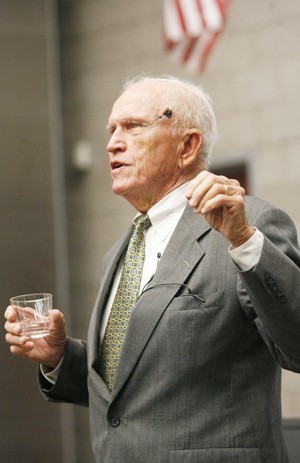Engineering students leaned silently forward in their chairs Monday as astronaut Frank Borman told them how he led the first team of astronauts to circle the moon in 1968.
“”Professionally, I would say the best decision I made was to try and get in NASA,”” Borman said.
Borman spoke in the Aerospace and Mechanical Engineering building about his experiences on Apollo 8, which orbited the moon 10 times before he and his team returned safely to Earth.
“”What we feared for as a crew was that we wouldn’t do our job well,”” he said.
Another of Borman’s major achievements at NASA was his standing as commander of the 1965 Gemini 7 Space Orbital Rendezvous with Gemini 6.
In his discussion, Borman reminisced about President John F. Kennedy’s announcement that the U.S. would get to the moon, but also recalled that at that time, the method and resources needed to do this were still unknown. The significance of the Gemini program was that it delved into everything needed to get to the moon that had never been attempted before.
He also discussed his work in terms of the Cold War. To Borman, the primary purpose of his work and mission was to beat the Russians to the moon. He stated that once this had been done, he had no desire to return to space.
“”Keep in mind integrity, knowledge, mission, sacrifice and risk,”” said Borman, advising current engineering students on how to deal with professional life. The team that got him to the moon possessed these qualities, which made the mission successful, he said.
Borman was born in Indiana and raised in Arizona. He attended Tucson High School and began flying at the age of 15. Borman received his bachelor’s degree in engineering from the U.S. Military Academy in 1950. He earned his master’s degree in aeronautical engineering from the California Institute of Technology in 1957 and completed an advanced management program at Harvard in 1970.
Borman has received a number of prestigious awards, including a Congressional Space Medal of Honor, the National Geographic Society’s Hubbard Medal and a place in the U.S. Astronaut Hall of Fame.
Before working at NASA, Borman was a fighter pilot in the U.S. Air Force, as well as a professor of engineering at West Point.
In his lecture, he said the reason behind joining the Air Force was to have his undergraduate tuition paid for. He was also CEO of Eastern Airlines from 1975-86.
At the end of the talk, students asked questions about Apollo 8 and also the current state of NASA. Borman said that despite his professional success, “”the most important moment of my life was marrying my perfect wife. I had a wonderful partner that supported me – we’ve been married 58 years now.””
He added that although his lifestyle was difficult on his family, they were incredibly supportive of his career and his mission to the moon.









